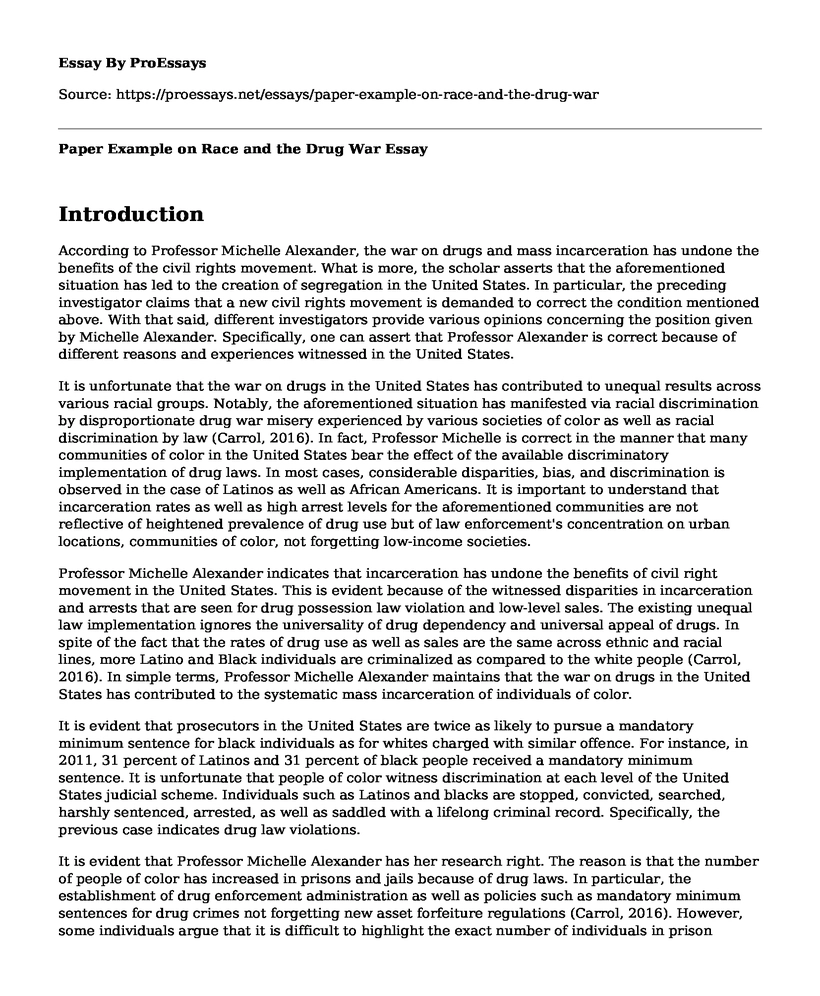Introduction
According to Professor Michelle Alexander, the war on drugs and mass incarceration has undone the benefits of the civil rights movement. What is more, the scholar asserts that the aforementioned situation has led to the creation of segregation in the United States. In particular, the preceding investigator claims that a new civil rights movement is demanded to correct the condition mentioned above. With that said, different investigators provide various opinions concerning the position given by Michelle Alexander. Specifically, one can assert that Professor Alexander is correct because of different reasons and experiences witnessed in the United States.
It is unfortunate that the war on drugs in the United States has contributed to unequal results across various racial groups. Notably, the aforementioned situation has manifested via racial discrimination by disproportionate drug war misery experienced by various societies of color as well as racial discrimination by law (Carrol, 2016). In fact, Professor Michelle is correct in the manner that many communities of color in the United States bear the effect of the available discriminatory implementation of drug laws. In most cases, considerable disparities, bias, and discrimination is observed in the case of Latinos as well as African Americans. It is important to understand that incarceration rates as well as high arrest levels for the aforementioned communities are not reflective of heightened prevalence of drug use but of law enforcement's concentration on urban locations, communities of color, not forgetting low-income societies.
Professor Michelle Alexander indicates that incarceration has undone the benefits of civil right movement in the United States. This is evident because of the witnessed disparities in incarceration and arrests that are seen for drug possession law violation and low-level sales. The existing unequal law implementation ignores the universality of drug dependency and universal appeal of drugs. In spite of the fact that the rates of drug use as well as sales are the same across ethnic and racial lines, more Latino and Black individuals are criminalized as compared to the white people (Carrol, 2016). In simple terms, Professor Michelle Alexander maintains that the war on drugs in the United States has contributed to the systematic mass incarceration of individuals of color.
It is evident that prosecutors in the United States are twice as likely to pursue a mandatory minimum sentence for black individuals as for whites charged with similar offence. For instance, in 2011, 31 percent of Latinos and 31 percent of black people received a mandatory minimum sentence. It is unfortunate that people of color witness discrimination at each level of the United States judicial scheme. Individuals such as Latinos and blacks are stopped, convicted, searched, harshly sentenced, arrested, as well as saddled with a lifelong criminal record. Specifically, the previous case indicates drug law violations.
It is evident that Professor Michelle Alexander has her research right. The reason is that the number of people of color has increased in prisons and jails because of drug laws. In particular, the establishment of drug enforcement administration as well as policies such as mandatory minimum sentences for drug crimes not forgetting new asset forfeiture regulations (Carrol, 2016). However, some individuals argue that it is difficult to highlight the exact number of individuals in prison because of the aforementioned policies. The reason is that experts find it hard to isolate the impact to any one cause.
The formation of a new social movement against imprisonment on the rise is important. Specifically, the preceding burgeoning movement plays a vital role in pursuing an approach of decarceration, which combines tangible objectives, radical critique, as well as direct action for mitigating the research of the carceral state. The movement should look at the claim made by Professor Michelle Alexander that the increase in the number of individuals in the criminal justice scheme is not a response to heightening crime rates. The construction of new prison systems should include innovative system of control. The movement should ensure that people returning from prisons get job opportunities, qualify for subsidized housing, and have the right to vote.
Conclusion
Overall, the new movement can be more effective if it acknowledges the ways various institutions and laws are still stack against people of color. The movement should come up with innovative strategies on the way to fix s system that prioritizes equality between black people and the whites. The movement means both excellent laws and a new collective consciousness. Such a movement will happen when different individuals come together to comfort an injustice among them as well as bring some transformations that were once thought impossible (Goodheart, 2014). People of color should establish a movement to fight for their rights and the rights of other individuals who are affected by the aforementioned laws and policies. In simple terms, Professor Michelle Alexander is correct about the idea of mass incarceration in the United States. Specifically, the truth remains that people of color are discriminated when it comes to drug laws in the country. Therefore, these individuals need to create a movement that fights for their rights.
References
Carrol, L. (2016). How the war on drugs affect incarceration rates. Politifact. Retrieved from http://www.politifact.com/truth-o-meter/statements/2016/jul/10/cory-booker/how-war-drugs-affected-incarceration-rates/
Goodheart, J. (2014). What's missing from the movement to end mass incarceration? Capital and Man. Retrieved from https://capitalandmain.com/whats-missing-from-the-movement-to-end-mass-incarceration
Cite this page
Paper Example on Race and the Drug War. (2022, Jun 13). Retrieved from https://proessays.net/essays/paper-example-on-race-and-the-drug-war
If you are the original author of this essay and no longer wish to have it published on the ProEssays website, please click below to request its removal:
- Does Inequality Makes Deliberative Democracy Impossible? Essay
- Essay Sample on The Importance of Accountability and Punctuality
- Essay Sample on 21st Century Digital Marketing Communication Tools
- Asian Americans: The Model Minority in the 1960s Immigration Movement - Essay Sample
- Nurses: Influencing Health Care Policy Essay Example
- Explore Sentinel City: Population and Income Analysis of Four Neighborhoods - Free Paper
- Impacts of Self-awareness of Interpersonal Communication in the Workplace - Free Essay Example







